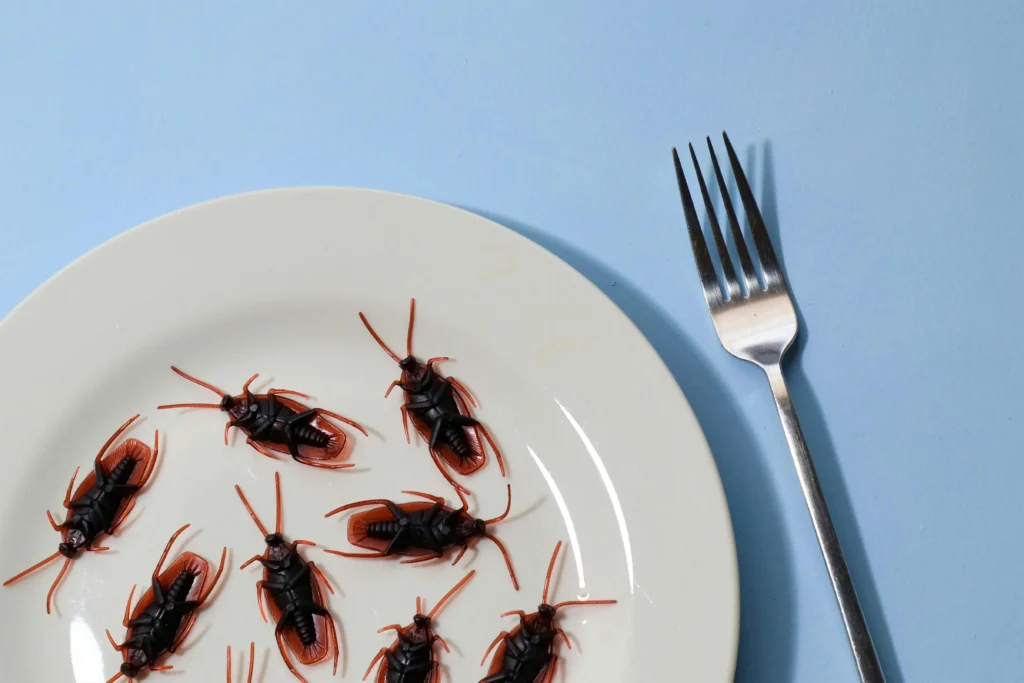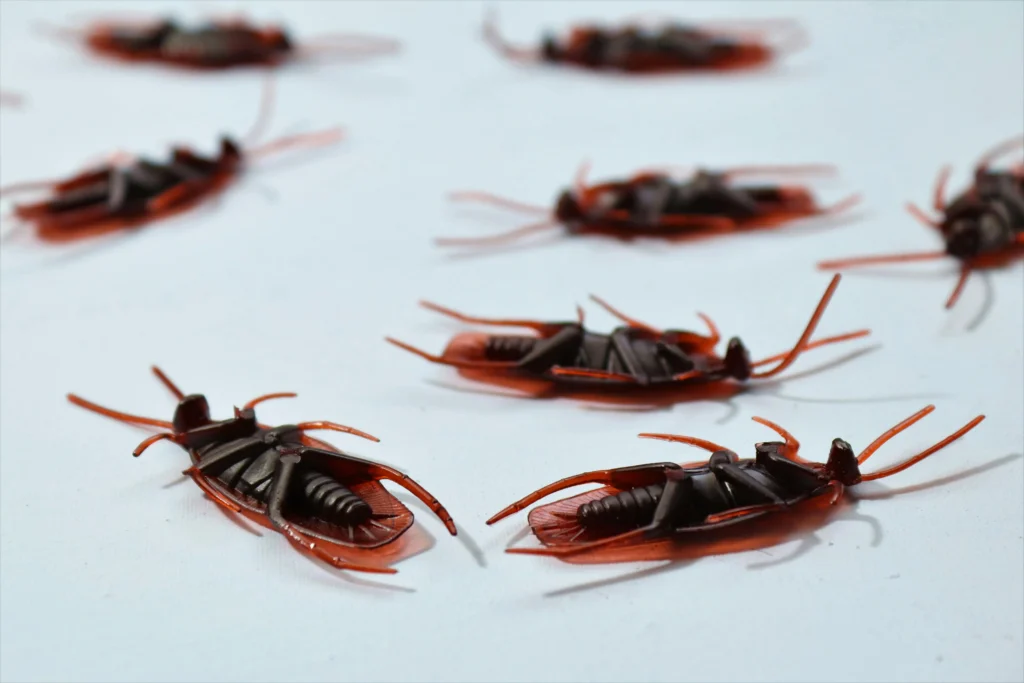
You opened the cabinet and saw it. Scuttling. In your kitchen.
Cockroaches are more than a nuisance. They carry pathogens such as Salmonella and E. coli, contaminate food, and trigger allergies and asthma, particularly in children. Before turning to chemical sprays, consider these proven, non-toxic home remedies. Each is backed by entomological research and designed to be safe around children and pets when used correctly.
This guide covers the most effective home remedies for cockroaches, ranked by real-world performance, with clear safety instructions and expected results.
Why Cockroaches Target Your Kitchen
Cockroaches thrive in kitchens because they offer food, moisture, and shelter. Grease residues, sugar spills, damp sponges, and cardboard packaging create an ideal environment. Roaches also follow scent trails left by others, meaning one sighting often signals a larger presence.
According to the National Pest Management Association (2024), 78% of kitchen roach nests are located within three feet of a food source.
Common hotspots include:
- Under and behind refrigerators
- Beneath stoves and toasters
- Inside cabinets, especially near spices or grains
- Along baseboards and under sinks
- Near trash bins or recycling containers
Addressing these areas is the first step before applying any remedy.
Best Home Remedies for Cockroaches in Kitchen

Below are the top natural remedies proven to kill or repel cockroaches. Each includes a clear explanation of how it works, where to place it, its effectiveness, and critical safety information.
Baking Soda Trap
Mix equal parts baking soda and sugar. The sugar attracts the roaches, and the baking soda interferes with their digestive system, producing gas that ruptures their internal organs and kills them.
Place the mixture in shallow containers or on small plates in areas frequented by roaches, such as under the sink, behind appliances, or along baseboards. Replace every three days until activity ceases.
Effectiveness: Kills approximately 60 to 70% of roaches within 72 hours. Works best for light to moderate infestations.
Safety Note: Non-toxic to humans and pets if accidentally ingested in small amounts. Keep containers out of reach to avoid unnecessary exposure. Do not use in open areas where pets or children may consume large quantities.
Neem Oil and Neem Leaves
Neem oil contains azadirachtin, a compound that disrupts the growth and reproduction cycles of cockroaches. The strong odor also acts as a repellent, driving adults away from treated areas.
Apply neem oil by mixing 10 drops with one cup of water and a teaspoon of dish soap. Spray along baseboards, under appliances, and inside cabinets. Reapply every three days. Alternatively, place dried neem leaves in corners or inside storage areas.
Effectiveness: Repels over 80% of roaches within 24 hours. Prevents nymphs from maturing into breeding adults.
Safety Note: Safe for humans and dogs when used as directed. Toxic to cats. Do not use in homes with felines, or ensure application is restricted to sealed, inaccessible areas.
Essential Oils: Peppermint, Eucalyptus, Tea Tree
Essential oils overwhelm the sensory receptors of cockroaches, causing them to flee. Peppermint oil is the most effective, followed by tea tree and eucalyptus.
Mix 15 drops of oil with one cup of water in a spray bottle. Apply to countertops, cabinet edges, appliance handles, and entry points. Reapply every 48 hours, as the scent dissipates quickly.
Effectiveness: Immediate repellent effect. Does not kill roaches but disrupts their movement and nesting patterns. Best used in conjunction with killing agents like baking soda or boric acid.
Safety Note: Safe for children and dogs when diluted. Tea tree oil is toxic to cats. Avoid use in multi-pet households unless cats are kept away from treated zones.
Boric Acid — Use With Caution
Boric acid kills roaches by damaging their exoskeleton and dehydrating their digestive tract. It is one of the most effective home remedies available, but must be used carefully.
Mix two parts boric acid with one part sugar and one part flour. Lightly dust the mixture along baseboards, behind large appliances, and in cracks or crevices. Never apply on open surfaces, countertops, or food preparation areas.
Effectiveness: Kills up to 90% of roaches within 72 hours when applied correctly. Ideal for moderate to heavy infestations.
Safety Note: Toxic if ingested by children or pets. Always wear gloves during application and wash hands thoroughly afterward. Store powder in a locked cabinet. If accidental ingestion occurs, contact Poison Control immediately.
Lemon Juice and Vinegar Spray
The acidity and strong scent of lemon juice and vinegar mask the pheromone trails roaches use to navigate, making it harder for them to find food and shelter. This solution repels but does not kill.
Mix equal parts lemon juice and white vinegar with water in a spray bottle. Wipe down countertops, handles, sink edges, and appliance surfaces daily.
Effectiveness: Temporary repellent. Lasts 12 to 24 hours. Best used as a maintenance tool after eliminating roaches with other methods.
Safety Note: Completely safe for all household members, including children and pets. May leave a strong scent. Ventilate the area after use.
Bay Leaves — Natural Repellent
Bay leaves emit vapors containing eugenol and cineole, compounds that irritate roach antennae and drive them away. They are ideal for use in pantries, cabinets, and storage areas.
Place two to three dried bay leaves inside spice jars, under sinks, in pantry corners, or taped behind cabinet doors. Replace monthly, or when the scent fades.
Effectiveness: Repels roaches for up to four weeks. Mild effect. Best used preventatively or in combination with stronger remedies.
Safety Note: Non-toxic and safe around children and pets. Bitter taste discourages chewing, but poses no health risk if accidentally ingested.
Cucumber Slices, Garlic, and Onion Mix — Folk Remedies
These traditional remedies rely on strong odors to repel roaches. While they may offer temporary relief, they are not reliable for elimination.
Place chopped onion, crushed garlic, and cucumber slices in a small bowl near roach entry points overnight. Discard in the morning.
Effectiveness: Mild to moderate repellent effect lasting less than 24 hours. Garlic and onion are more potent than cucumber but create strong kitchen odors.
Safety Note: All ingredients are safe for household use. No toxicity risk to humans or pets. Not recommended as a standalone solution.
Preventing Cockroaches Naturally
Eliminating roaches is only half the battle. Prevention ensures they do not return.
Daily: Wipe down surfaces after cooking. Sweep crumbs. Take out trash nightly. Spray vinegar-lemon solution on handles and edges.
Weekly: Vacuum behind appliances. Clean toaster trays. Check under sinks for leaks. Reapply repellent sprays.
Monthly: Seal cracks in walls and baseboards. Replace bay leaves. Inspect window and door seals. Clean out the pantry and discard old cardboard boxes.
When Home Remedies Are Not Enough – Call SoftCare Pest Control
If you continue to see three or more roaches within 24 hours, or notice droppings, egg casings, or a musty odor, you likely have an established infestation. At this stage, home remedies are insufficient.
Professional intervention is not a failure. It is a necessary step. Roaches reproduce rapidly. One female can produce over 300 offspring in six months.
Why Choose SoftCare Pest Control?
SoftCare Pest Control specializes in kitchen-focused, non-toxic treatments designed for homes with children and pets. Their approach includes:
- Free inspection to locate nests and entry points
- Application of child-safe gel baits and insect growth regulators
- Customized prevention plan to seal vulnerabilities
- 30-day follow-up service and satisfaction guarantee
Serving Navi Mumbai & beyond, SoftCare is a trusted local provider with verified 5-star reviews.
Contact SoftCare Pest Control within 48 hours of confirming an infestation. Their Kitchen Rescue Package includes a free inspection and targeted treatment to eliminate roaches at the source.
Conclusion
Cockroaches in the kitchen are a serious issue, but not one that requires panic or harsh chemicals. With home remedies for cockroaches like baking soda traps, neem oil barriers, and essential oil sprays, you can eliminate the majority of invaders safely and affordably.
Starting tonight. Place a baking soda mixture under the sink. Spray peppermint oil along the baseboards. Tuck bay leaves into your pantry.
And if the problem persists, do not hesitate to call SoftCare Pest Control. Professional help is the smart, responsible next step, not a last resort.
Your kitchen belongs to you. Take it back, naturally, safely, and for good.
FAQs
Q. What natural remedies kill cockroaches in the kitchen?
A. Baking soda mixed with sugar and boric acid, when used correctly, are the only natural options that actually kill roaches. The rest mostly repel.
Q. Does baking soda and sugar work to get rid of cockroaches?
A. Yes, it works. Sugar attracts them, and baking soda causes internal gas buildup that kills them, though it’s best for minor infestations.
Q. Is neem oil an effective cockroach killer or repellent?
A. Neem oil is not a fast killer but a strong repellent that also disrupts the growth of young roaches, making it useful for long term control.
Q. What smells do cockroaches dislike and how can you use them in your kitchen?
A. Cockroaches hate peppermint, eucalyptus, tea tree, bay leaf, and citrus. Use diluted sprays on baseboards or place dried leaves in cabinets and pantries.
Q. Are essential oils safe and effective for cockroach control around food areas?
A. They are safe if diluted and wiped off surfaces after use. They repel roaches well but do not kill them and need reapplication every two days.
Q. How long do home remedies take to eliminate cockroaches?
A. Most take three to seven days to show results. Boric acid works fastest, within 24 to 72 hours, while repellents like vinegar offer only temporary relief.
Q. Can boric acid kill cockroach eggs too?
A. No, boric acid does not kill eggs. It only affects nymphs and adults that come into contact with or ingest it after the eggs have hatched.
Q. How do you prevent cockroaches naturally in the kitchen?
A. Wipe counters daily, store food in sealed containers, fix leaks, take out trash nightly, and use bay leaves or neem sprays in hidden corners weekly.
Q. What precautions should you take when using DIY cockroach remedies if you have kids or pets?
A. Store boric acid and neem oil out of reach, avoid tea tree oil if you have cats, and place all bait stations where children and pets cannot access them. When should home remedies be replaced by professional pest control?
Call a professional like SoftCare Pest Control if you see three or more roaches in a day, find droppings or egg cases, or notice a lingering musty smell.

One Response